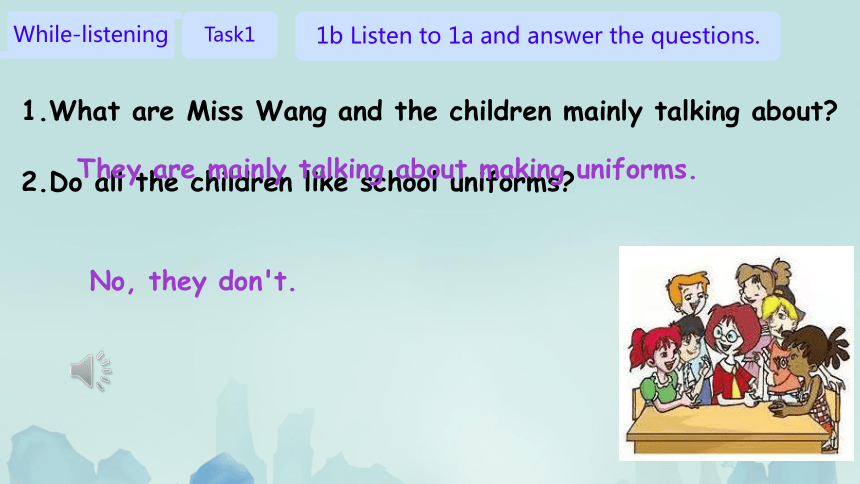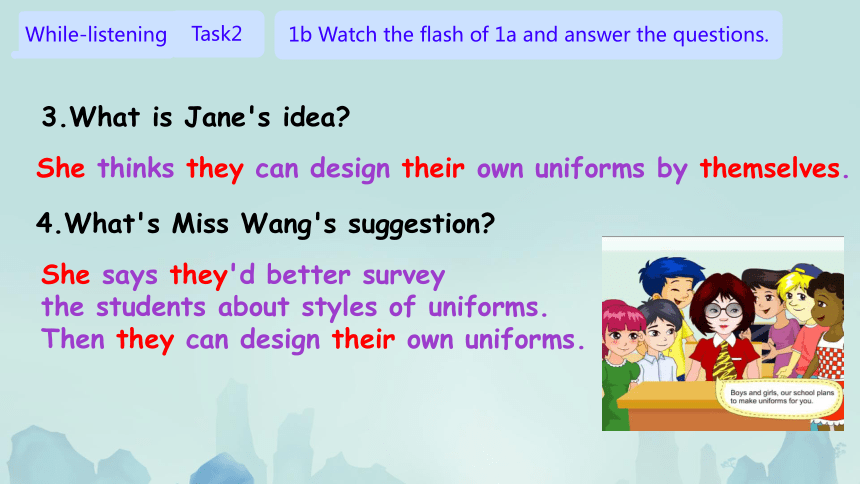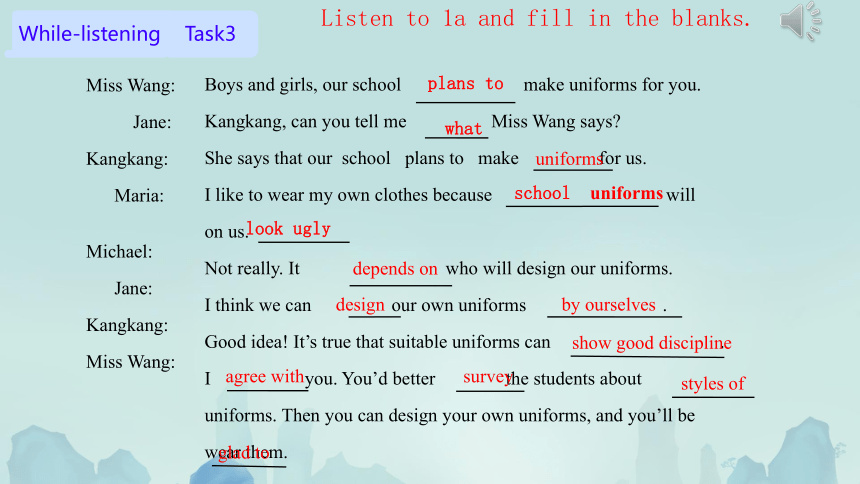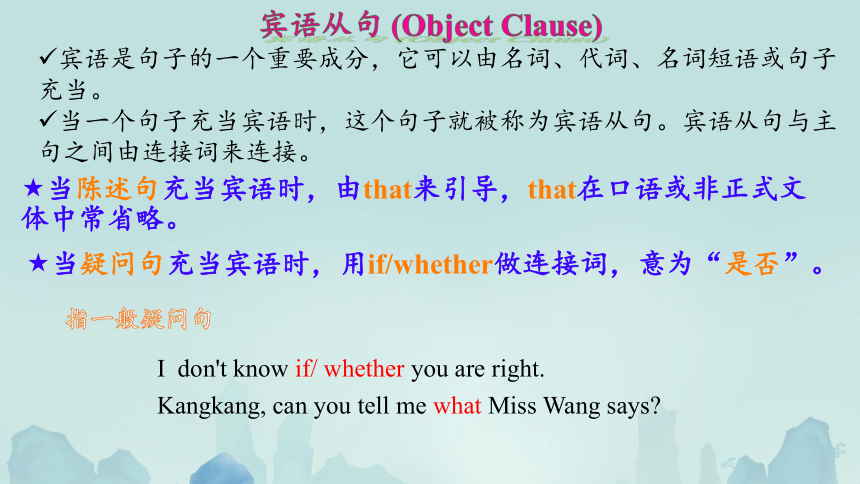Unit 8 Our Clothes Topic 2 We can design our own uniforms. Section A (共16张PPT,内嵌音频)
文档属性
| 名称 | Unit 8 Our Clothes Topic 2 We can design our own uniforms. Section A (共16张PPT,内嵌音频) |

|
|
| 格式 | pptx | ||
| 文件大小 | 12.6MB | ||
| 资源类型 | 教案 | ||
| 版本资源 | 仁爱科普版 | ||
| 科目 | 英语 | ||
| 更新时间 | 2025-04-25 16:07:44 | ||
图片预览







文档简介
(共16张PPT)
Unit8 Our clothes
Topic2 We can design our own uniforms.
Section A
Do you like our school uniforms?
Pre-listening
Talking
look nice/ugly
show good discipline
While-listening
Task1
1.What are Miss Wang and the children mainly talking about
2.Do all the children like school uniforms
1b Listen to 1a and answer the questions.
They are mainly talking about making uniforms.
No, they don't.
While-listening
Task2
1b Watch the flash of 1a and answer the questions.
3.What is Jane's idea
4.What's Miss Wang's suggestion
She thinks they can design their own uniforms by themselves.
She says they'd better survey
the students about styles of uniforms.
Then they can design their own uniforms.
Boys and girls, our school make uniforms for you.
Kangkang, can you tell me Miss Wang says
She says that our school plans to make for us.
I like to wear my own clothes because will on us.
Not really. It who will design our uniforms.
I think we can our own uniforms .
Good idea! It’s true that suitable uniforms can . I you. You’d better the students about uniforms. Then you can design your own uniforms, and you’ll be wear them.
Miss Wang:
Jane:
Kangkang:
Maria:
Michael:
Jane:
Kangkang: Miss Wang:
Listen to 1a and fill in the blanks.
While-listening
Task3
depends on
plans to
what
uniforms
school uniforms
look ugly
design
by ourselves
show good discipline
agree with
survey
styles of
glad to
Miss Wang:
Jane:
Kangkang:
Maria:
Michael:
Jane:
Kangkang:
Miss Wang:
Boys and girls, our school plans to make uniforms for you.
Kangkang, can you tell me what Miss Wang says
She says that our school plans to make uniforms for us.
I like to wear my own clothes because school uniforms will look ugly on us.
Not really. It depends on who will design our uniforms.
I think we can design our own uniforms by ourselves.
Good idea! It’s true that suitable uniforms can show good discipline.
I agree with you. You’d better survey the students about styles of uniforms. Then you can design your own uniforms, and you’ll be glad to wear them. 47
make sth. for sb. 为某人做某物
look ugly on sb. 在某人身上看起来很丑
It's + adj. + that 从句
agree with sb. 赞成某人
be glad to do sth.
乐意做某事
While-listening
Task3
Find out object clauses.
depend on/ upon 取决于、依靠
宾语是句子的一个重要成分,它可以由名词、代词、名词短语或句子充当。
当一个句子充当宾语时,这个句子就被称为宾语从句。宾语从句与主句之间由连接词来连接。
宾语从句 (Object Clause)
当陈述句充当宾语时,由that来引导,that在口语或非正式文体中常省略。
当疑问句充当宾语时,用if/whether做连接词,意为“是否”。
I don't know if/ whether you are right.
Kangkang, can you tell me what Miss Wang says
指一般疑问句
宾语从句 (Object Clause)
疑问词引导的宾语从句
宾语从句用陈述句语序
Can you tell me what Miss Wang says
拆为两个简单句:1) Can you tell me 2) What does Miss Wang say
What are they talking about I want to know. (合并为宾语从句)
Does he like Beijing Opera Do you know
I want to know what they are talking about.
Do you know if/ whether he likes Beijing Opera
疑问词
疑问代词
疑问副词
what which who whose
when how where why
3 Changing the sentences after the example, .
Pay attention to the order of object clause.
Example: 1.Could you tell me What clothes do you like best (合并为宾语从句)
Exercise1
Could you tell me what clothes you like best
2.Could you tell me What do you like to wear in summer (合并为宾语从句)
3.Could you tell me How often does Kangkang go shopping (合并为宾语从句)
4.why tell uniforms me you Could you like don't shcool (连词成句)
Post-listening
Could you tell me what you like to wear in summer
Could you tell me how often Kangkang goes shopping
Could you tell me why you don't like school uniforms
1c The children are discussing how to design their uniforms.
Make up conversations after the example.
Where can we make them
What style do you like
what materials should we choose
What color do you want
Example:
A:Can you tell me what Yujing asks
B:She asks what materials they should choose.
Exercise2
A:Can you tell me what Lijiajia asks
B:She asks where they can make them.
A:Can you tell me what Wangsisi asks
B:She asks what color they want.
A:Can you tell me what Chen wenrong asks
B:She asks what style they like.
Post-listening
2a
Listen to the conversation and put A, B and C in the right places.
(Kangkang is interviewing a policewoman.)
Kangkang:
Policewoman:
Kangkang:
Policewoman:
Policewoman:
Kangkang:
Excuse me, madam. _______
We usually wear uniforms when we are at work, but sometimes we wear plain clothes to carry out special tasks.
_________
Sure. When we are wearing uniforms, people in trouble can find us. _____
Uniforms can also show good discipline and make you look important.
Yes.You're right.
A. Is it important for you to wear uniforms at work
B. Could you tell me when you wear your uniforms
C. And our uniforms may stop some people from
doing bad things.
在工作
便衣
执行
stop/ keep ... from doing sth. 阻止...做某事
stop doing sth. 停止做某事
stop to do sth. 停下去做(另一件事)
在困境中
B
A
C
Read 2a and answer the following questions. Then try to give a short report.
2b
1.When does the policewoman wear her uniform
2.Why does the policewoman think it's important to wear uniforms
They wear uniforms when they are at work.
Because when they are wearing uniforms, people in trouble can find them, and their uniforms may stop some people from doing bad things.
3
Make up conversations after the example, using the sentences in the box. Pay attention to the word order of object clause.
Example:
A: Could you please tell me what clothes you like best
B: Sure. I like jeans best.
What clothes do you like best
What do you like to wear in summer
When/ Where do you wear school uniforms
Why do/ don't you like school uniforms
How often do you go shopping
Who usually buys clothes for you
...
Exercises in class
单项选择。
( ) 1. _____ is necessary for students to get up early and go to bed early.
A. This B. That C. What D. It
( ) 2. — I think maths is more important than English.
— But I really can't agree______you.
A. of B. at C. with D. for
( ) 3. Policemen uniforms may stop some people from______ something bad.
A.to do B.do C. doing D. does
( ) 4. — Could you tell me ______ tomorrow morning
— Well, it will start at 9 o’clock.
A. when the meeting will start B. where will the meeting start
C. where the meeting start D. When the meeting would start
( ) 5. The girl ______ trouble is a middle school student from Japan.
A. on B. at C. in D. of
D
C
C
A
C
Summary
We learn:
1. Some new words and phrases:
depend, discipline, survey, interview, plain
depend on,plain clothes,carry out,stop ... from doing ...
2. The object clauses:
Can you tell me what Miss Wang says
She asks what materials they should choose.
We can:
◆ Talk about uniforms:
I like to wear my own clothes because school uniforms will look ugly on us.
We usually wear uniforms when we are at work.
Our uniforms may stop some people from doing bad things.
Uniforms can also show good discipline and make you look important.
Love your uniform
Love your school
Love your study
1.Recite key points in Section A.
2.Complete Section A in newspapers.
3.Preview Section B.
Homework
Unit8 Our clothes
Topic2 We can design our own uniforms.
Section A
Do you like our school uniforms?
Pre-listening
Talking
look nice/ugly
show good discipline
While-listening
Task1
1.What are Miss Wang and the children mainly talking about
2.Do all the children like school uniforms
1b Listen to 1a and answer the questions.
They are mainly talking about making uniforms.
No, they don't.
While-listening
Task2
1b Watch the flash of 1a and answer the questions.
3.What is Jane's idea
4.What's Miss Wang's suggestion
She thinks they can design their own uniforms by themselves.
She says they'd better survey
the students about styles of uniforms.
Then they can design their own uniforms.
Boys and girls, our school make uniforms for you.
Kangkang, can you tell me Miss Wang says
She says that our school plans to make for us.
I like to wear my own clothes because will on us.
Not really. It who will design our uniforms.
I think we can our own uniforms .
Good idea! It’s true that suitable uniforms can . I you. You’d better the students about uniforms. Then you can design your own uniforms, and you’ll be wear them.
Miss Wang:
Jane:
Kangkang:
Maria:
Michael:
Jane:
Kangkang: Miss Wang:
Listen to 1a and fill in the blanks.
While-listening
Task3
depends on
plans to
what
uniforms
school uniforms
look ugly
design
by ourselves
show good discipline
agree with
survey
styles of
glad to
Miss Wang:
Jane:
Kangkang:
Maria:
Michael:
Jane:
Kangkang:
Miss Wang:
Boys and girls, our school plans to make uniforms for you.
Kangkang, can you tell me what Miss Wang says
She says that our school plans to make uniforms for us.
I like to wear my own clothes because school uniforms will look ugly on us.
Not really. It depends on who will design our uniforms.
I think we can design our own uniforms by ourselves.
Good idea! It’s true that suitable uniforms can show good discipline.
I agree with you. You’d better survey the students about styles of uniforms. Then you can design your own uniforms, and you’ll be glad to wear them. 47
make sth. for sb. 为某人做某物
look ugly on sb. 在某人身上看起来很丑
It's + adj. + that 从句
agree with sb. 赞成某人
be glad to do sth.
乐意做某事
While-listening
Task3
Find out object clauses.
depend on/ upon 取决于、依靠
宾语是句子的一个重要成分,它可以由名词、代词、名词短语或句子充当。
当一个句子充当宾语时,这个句子就被称为宾语从句。宾语从句与主句之间由连接词来连接。
宾语从句 (Object Clause)
当陈述句充当宾语时,由that来引导,that在口语或非正式文体中常省略。
当疑问句充当宾语时,用if/whether做连接词,意为“是否”。
I don't know if/ whether you are right.
Kangkang, can you tell me what Miss Wang says
指一般疑问句
宾语从句 (Object Clause)
疑问词引导的宾语从句
宾语从句用陈述句语序
Can you tell me what Miss Wang says
拆为两个简单句:1) Can you tell me 2) What does Miss Wang say
What are they talking about I want to know. (合并为宾语从句)
Does he like Beijing Opera Do you know
I want to know what they are talking about.
Do you know if/ whether he likes Beijing Opera
疑问词
疑问代词
疑问副词
what which who whose
when how where why
3 Changing the sentences after the example, .
Pay attention to the order of object clause.
Example: 1.Could you tell me What clothes do you like best (合并为宾语从句)
Exercise1
Could you tell me what clothes you like best
2.Could you tell me What do you like to wear in summer (合并为宾语从句)
3.Could you tell me How often does Kangkang go shopping (合并为宾语从句)
4.why tell uniforms me you Could you like don't shcool (连词成句)
Post-listening
Could you tell me what you like to wear in summer
Could you tell me how often Kangkang goes shopping
Could you tell me why you don't like school uniforms
1c The children are discussing how to design their uniforms.
Make up conversations after the example.
Where can we make them
What style do you like
what materials should we choose
What color do you want
Example:
A:Can you tell me what Yujing asks
B:She asks what materials they should choose.
Exercise2
A:Can you tell me what Lijiajia asks
B:She asks where they can make them.
A:Can you tell me what Wangsisi asks
B:She asks what color they want.
A:Can you tell me what Chen wenrong asks
B:She asks what style they like.
Post-listening
2a
Listen to the conversation and put A, B and C in the right places.
(Kangkang is interviewing a policewoman.)
Kangkang:
Policewoman:
Kangkang:
Policewoman:
Policewoman:
Kangkang:
Excuse me, madam. _______
We usually wear uniforms when we are at work, but sometimes we wear plain clothes to carry out special tasks.
_________
Sure. When we are wearing uniforms, people in trouble can find us. _____
Uniforms can also show good discipline and make you look important.
Yes.You're right.
A. Is it important for you to wear uniforms at work
B. Could you tell me when you wear your uniforms
C. And our uniforms may stop some people from
doing bad things.
在工作
便衣
执行
stop/ keep ... from doing sth. 阻止...做某事
stop doing sth. 停止做某事
stop to do sth. 停下去做(另一件事)
在困境中
B
A
C
Read 2a and answer the following questions. Then try to give a short report.
2b
1.When does the policewoman wear her uniform
2.Why does the policewoman think it's important to wear uniforms
They wear uniforms when they are at work.
Because when they are wearing uniforms, people in trouble can find them, and their uniforms may stop some people from doing bad things.
3
Make up conversations after the example, using the sentences in the box. Pay attention to the word order of object clause.
Example:
A: Could you please tell me what clothes you like best
B: Sure. I like jeans best.
What clothes do you like best
What do you like to wear in summer
When/ Where do you wear school uniforms
Why do/ don't you like school uniforms
How often do you go shopping
Who usually buys clothes for you
...
Exercises in class
单项选择。
( ) 1. _____ is necessary for students to get up early and go to bed early.
A. This B. That C. What D. It
( ) 2. — I think maths is more important than English.
— But I really can't agree______you.
A. of B. at C. with D. for
( ) 3. Policemen uniforms may stop some people from______ something bad.
A.to do B.do C. doing D. does
( ) 4. — Could you tell me ______ tomorrow morning
— Well, it will start at 9 o’clock.
A. when the meeting will start B. where will the meeting start
C. where the meeting start D. When the meeting would start
( ) 5. The girl ______ trouble is a middle school student from Japan.
A. on B. at C. in D. of
D
C
C
A
C
Summary
We learn:
1. Some new words and phrases:
depend, discipline, survey, interview, plain
depend on,plain clothes,carry out,stop ... from doing ...
2. The object clauses:
Can you tell me what Miss Wang says
She asks what materials they should choose.
We can:
◆ Talk about uniforms:
I like to wear my own clothes because school uniforms will look ugly on us.
We usually wear uniforms when we are at work.
Our uniforms may stop some people from doing bad things.
Uniforms can also show good discipline and make you look important.
Love your uniform
Love your school
Love your study
1.Recite key points in Section A.
2.Complete Section A in newspapers.
3.Preview Section B.
Homework
同课章节目录
- Unit 5 Feeling excited
- Topic 1 You look excited
- Topic 2 I’m feeling better now.
- Topic 3 Many things can affect our feelings.
- Unit 6 Enjoying Cycling
- Topic 1 We're going on a three-day visit to Mount
- Topic 2 How about exploring Tian’anmen Square?
- Topic 3 Bicycle riding is good exercise.
- Unit 7 Food festival
- Topic 1 We’re preparing for a food festival.
- Topic 2 I’m not sure whether I can cook it well.
- Topic 3 I Cooked the Most Successfully
- Unit 8 Our Clothes
- Topic 1 We will have a class fashion show.
- Topic 2 We can design our own uniforms.
- Topic 3 He said the fashion show was wonderful.
